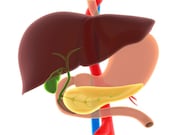Tag: Caffeine / Coffee / Tea
Green Tea, Coffee Intake Linked to Reduced Mortality in T2DM
Higher levels of consumption of green tea and/or coffee may reduce mortality in those with T2DM
Plasma Caffeine Concentration Lower in Parkinson Disease
Results similar for caffeine metabolites and non-xanthine marker for coffee consumption in plasma
Coffee, Tea, Soda Tied to Higher Risk for Gastroesophageal Reflux
Consuming water, juice, milk not linked to increased risk for gastroesophageal reflux symptoms
Maternal Caffeine Intake May Be Tied to Negative Pregnancy Outcomes
Caffeine-related increased risk reported with moderate-to-high levels of consistency for five outcomes
Daily Coffee May Lower Risk for Developing Arrhythmia
Each additional cup tied to further decrease in arrhythmia risk
Tea Drinking Linked to Reduced Risk for Atherosclerotic CVD
Risks for atherosclerotic CVD incidence and mortality, all-cause mortality lower in habitual tea drinkers
Coffee Consumption Does Not Affect Insulin Sensitivity
Consumption of four cups of coffee per day linked to loss of fat mass, reduction in urinary creatinine
Electronic Device Use Tied to Sugar, Caffeine Intake in Teens
While energy drink consumption is declining, more electronic device use tied to more sugar, caffeine consumption
Drinking More Coffee Tied to Lower Risk for Gallstone Disease
Individuals with genetic variants linked to increased coffee consumption have reduced risk for gallstones
Coffee May Speed Up Recovery of Function After Bowel Surgery
Time to first postoperative bowel movement and length of hospital stay shorter in coffee drinkers














